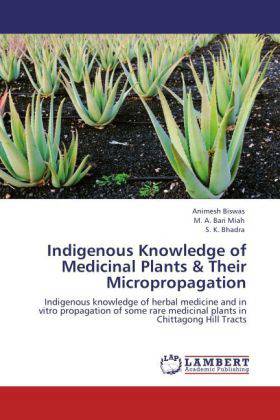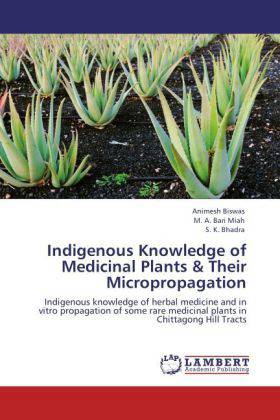
- Afhalen na 1 uur in een winkel met voorraad
- Gratis thuislevering in België vanaf € 30
- Ruim aanbod met 7 miljoen producten
- Afhalen na 1 uur in een winkel met voorraad
- Gratis thuislevering in België vanaf € 30
- Ruim aanbod met 7 miljoen producten
Zoeken
Indigenous Knowledge of Medicinal Plants & Their Micropropagation
Indigenous knowledge of herbal medicine and in vitro propagation of some rare medicinal plants in Chittagong Hill Tracts
Animesh Biswas, M A Bari Miah, S K Bhadra
Paperback | Engels
€ 77,95
+ 155 punten
Omschrijving
Chittagong Hill Tracts is the only extensive hilly areas of Bangladesh hold the vast reserves of medicinal plants, which is being used by its inhabitants belonging to different indigenous and ethnic groups.The study was undertaken aimed to address the indigenous knowledge of traditional herbal treatments and developing in vitro regeneration protocols for endangered species. One hundred ninety medicinal plant species belonging to 147 genera and 57 families were identified and studied. Sixty different diseases were known treated with these 190 medicinal plants and fever was noted as the most common disease being treated by the use of 35 plant species. On scoring perspective, among the rare species Plumbago indica possessed the highest (20.88) and Ocimum basilicum had the lowest (16.0) rarity score under this study. In vitro study was done in several of theses endangered species presenting tissue culture protocols for their micropropagation as well as their conservation, On the other hand ethnobotanical study of 190 plant species presents a invaluable document of age old inherited and indigenous knowledge of tribal peoples living over the hill tracts.
Specificaties
Betrokkenen
- Auteur(s):
- Uitgeverij:
Inhoud
- Aantal bladzijden:
- 232
- Taal:
- Engels
Eigenschappen
- Productcode (EAN):
- 9783847373520
- Verschijningsdatum:
- 6/02/2012
- Uitvoering:
- Paperback
- Formaat:
- Trade paperback (VS)
- Afmetingen:
- 152 mm x 229 mm
- Gewicht:
- 344 g

Alleen bij Standaard Boekhandel
+ 155 punten op je klantenkaart van Standaard Boekhandel
Beoordelingen
We publiceren alleen reviews die voldoen aan de voorwaarden voor reviews. Bekijk onze voorwaarden voor reviews.











